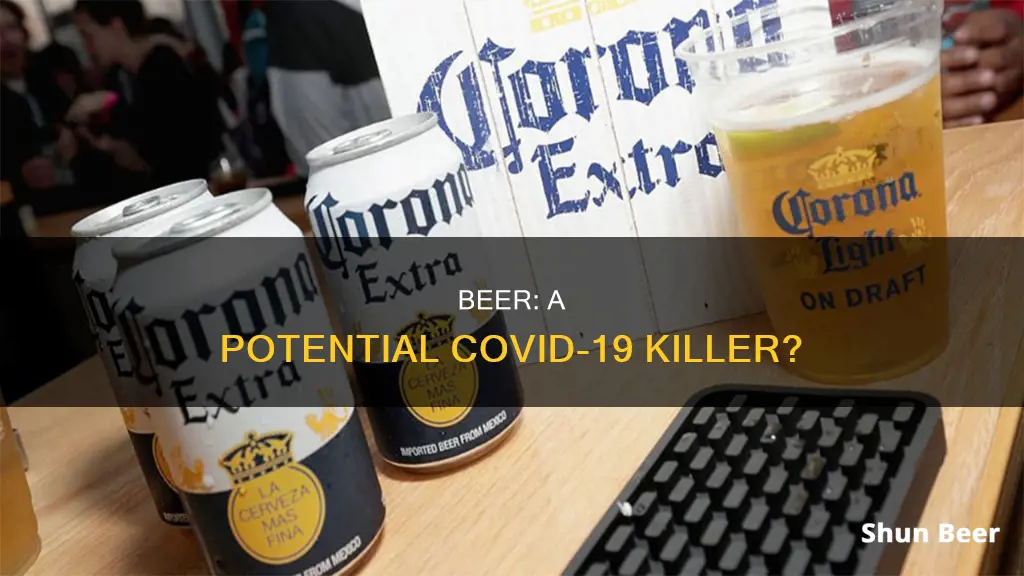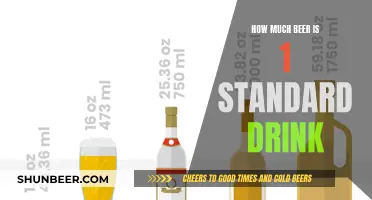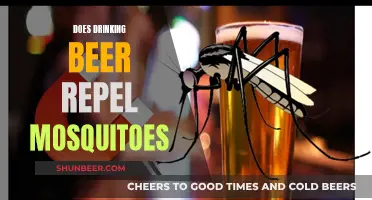
The ongoing COVID-19 pandemic has brought about many claims and theories about the novel coronavirus and its relationship with alcohol. While alcohol-based hand sanitisers with a concentration of 60% or higher are effective at eliminating several types of germs, including SARS-CoV-2, the same cannot be said for drinking alcoholic beverages. Consuming alcohol does not kill the coronavirus and can, in fact, increase the risk of health problems if indulged in excessively.
What You'll Learn
- Beer contains ethyl alcohol, which can be used to kill some viruses
- Ethyl alcohol is ineffective against non-enveloped viruses like polio and hepatitis A
- The alcohol concentration in beer is too low to kill viruses
- Drinking alcohol does not kill viruses inside your body
- Consuming alcoholic drinks does not protect you from COVID-19

Beer contains ethyl alcohol, which can be used to kill some viruses
While ethyl alcohol can be an effective virucide when used topically, consuming it through drinking beer or other alcoholic beverages will not kill viruses inside your body. The digestive process breaks down the alcohol molecules, and the reduced concentration makes it difficult for the body to fight off viruses or bacteria. Additionally, excessive alcohol consumption can increase the risk of health problems and cause harm to the digestive tract, brain, and liver.
The World Health Organization (WHO) has clearly stated that consuming alcoholic drinks does not protect against COVID-19 and can increase the risk of health issues if consumed in excess. While alcohol-based hand sanitizers and disinfectants can help prevent the transmission of SARS-CoV-2, the virus that causes COVID-19, drinking beer or other alcoholic beverages will not provide any protective effects.
It is important to prioritize proper hand hygiene by washing hands with soap and water for at least 20 seconds. When soap and water are not available, the CDC recommends using hand sanitizers with at least 60% alcohol content. Additionally, alcohol-based products should only be used as directed and kept out of the reach of children to prevent accidental ingestion, which can be dangerous and even fatal.
The Cost of Beer vs Mixed Drinks: Which is Cheaper?
You may want to see also

Ethyl alcohol is ineffective against non-enveloped viruses like polio and hepatitis A
Ethyl alcohol, also known as ethanol, is a type of alcohol found in alcoholic beverages. While ethyl alcohol can be effective against certain viruses, it is not effective against all viruses. In particular, ethyl alcohol is ineffective against non-enveloped viruses, which lack a lipid membrane.
Non-enveloped viruses, such as polio and hepatitis A, have a protein shell or capsid that protects their nucleic acid core. The protein structure of these viruses makes them resistant to disruption by ethyl alcohol. As a result, ethyl alcohol is unable to penetrate and disrupt the viral structure, which is necessary for inactivation.
The effectiveness of ethyl alcohol against viruses depends on its concentration and the specific virus in question. While ethyl alcohol can be effective against some enveloped viruses, such as SARS-CoV-2, it is not effective against all virus types. Therefore, it is important to understand the limitations of ethyl alcohol and other disinfectants when it comes to virus inactivation.
The World Health Organization (WHO) has recommended the use of alcohol-based hand sanitizers, which often contain ethyl alcohol, to prevent the spread of infectious diseases, including COVID-19. However, it is important to note that consuming alcoholic beverages does not offer protection against COVID-19 and can increase the risk of health problems when consumed in excess.
Bottom-Fill Beer Cups: How Do They Work?
You may want to see also

The alcohol concentration in beer is too low to kill viruses
It is important to note that consuming alcohol will not kill viruses inside your body. While alcohol-based cleansers and hand sanitizers with a high enough alcohol concentration (60-70%) can be effective at killing some viruses, including SARS-CoV-2, the virus that causes COVID-19, this does not apply to drinking alcoholic beverages. The alcohol concentration in beer, which typically averages around 40%, is too low to be effective against any virus.
The efficacy of alcohol against viruses depends on both the concentration of the alcohol and the type of virus. Enveloped viruses have a lipid membrane, while non-enveloped viruses do not. Generally, non-enveloped viruses are more resistant to disinfectants. Isopropyl alcohol, which is commonly used in sanitizers and rubbing alcohol, is effective against enveloped viruses but not against non-enveloped viruses. Ethyl alcohol, which is present in alcoholic beverages, can work against some non-enveloped viruses in addition to enveloped viruses. However, even ethyl alcohol is ineffective against certain non-enveloped viruses, such as the poliovirus and hepatitis A.
After consuming alcoholic beverages, the body breaks down the molecules of ethanol during the digestive process, making it more difficult for the body to fight off viruses or bacteria. Therefore, drinking alcohol does not provide protection against viruses and can increase the risk of health problems if consumed in excess. It is important to prioritize hand-washing with soap and water or using hand sanitizers with at least 60% alcohol to reduce the risk of contracting viruses like COVID-19.
Lap-Band Surgery and Alcohol: What You Can Drink
You may want to see also

Drinking alcohol does not kill viruses inside your body
It is important to understand that while alcohol-based cleansers and hand sanitisers can kill some viruses, including SARS-CoV-2, the virus that causes COVID-19, consuming alcoholic drinks does not have the same effect on viruses inside your body. The World Health Organization (WHO) has stated that drinking alcohol does not protect you from COVID-19 and can increase your risk of health problems if consumed in excess.
The effectiveness of alcohol against viruses depends on the concentration and type of alcohol, as well as the species of the virus. For alcohol-based hand sanitisers to be effective, they need to contain at least 60% alcohol. In contrast, the alcohol content in hard drinks such as whisky and vodka is much lower, typically around 40%. At this proportion, alcohol is mostly ineffective against viruses.
The type of virus also plays a role in the effectiveness of alcohol. There are two main types of viruses: enveloped viruses, which have a lipid membrane, and non-enveloped viruses, which do not. Generally, non-enveloped viruses are more resistant to disinfectants. While isopropyl alcohol works against enveloped viruses, it is not effective against non-enveloped viruses. Ethyl alcohol, which is commonly found in alcoholic beverages, can work against some enveloped viruses and a few non-enveloped viruses. However, it is ineffective against non-enveloped viruses such as polio and hepatitis A.
Consuming alcohol can actually make it more difficult for the body to kill viruses or bacteria. The digestive process breaks down the molecules of ethanol, impairing the body's ability to fight off pathogens. Therefore, it is important to understand that drinking alcohol does not kill viruses inside your body and should not be relied upon as a method of protection against COVID-19 or other viral infections.
A Beginner's Guide to Enjoying a Beer Flight
You may want to see also

Consuming alcoholic drinks does not protect you from COVID-19
It is important to understand that consuming alcoholic drinks does not protect you from COVID-19. While it is true that alcohol-based hand sanitizers and disinfectants can be effective in reducing the risk of COVID-19 transmission, this does not extend to the consumption of alcoholic beverages.
The World Health Organization (WHO) has clearly stated that drinking alcohol does not offer any protection against COVID-19. On the contrary, excessive alcohol consumption can increase the risk of health problems. It is crucial to prioritize proper hand hygiene by washing hands with soap and water for at least 20 seconds, and when soap and water are not available, using hand sanitizers with at least 60% alcohol content can be an alternative.
The effectiveness of alcohol against viruses depends on both the concentration of alcohol and the type of virus. For alcohol to be effective against pathogens, it needs to have a concentration of at least 60% to 70%. The alcohol content in alcoholic beverages, such as whisky and vodka, is typically around 40%, which is too low to be effective against viruses.
Additionally, consuming high concentrations of alcohol, such as 70% rubbing alcohol, can be extremely harmful to the body and can lead to serious health issues, including alcohol poisoning, organ damage, and even death. Therefore, it is important to understand that consuming alcoholic drinks will not provide any protection against COVID-19 and may even increase the risk of health complications.
Strategizing My Career Path: Beer Distributor Experience
You may want to see also
Frequently asked questions
No. While alcohol-based hand sanitizers with a concentration of 60% or higher can eliminate some germs, drinking alcoholic beverages will not reduce your risk of contracting COVID-19.
The alcohol concentration in alcoholic beverages is too low to be effective against the coronavirus. Alcohol is only effective against the coronavirus when it is in the form of a hand sanitizer or disinfectant with a concentration of 60% to 70%.
Yes, consuming alcohol will not protect you from COVID-19 and can increase your risk of health problems if consumed in excess. Excessive drinking can also put you at greater risk for other health problems.







